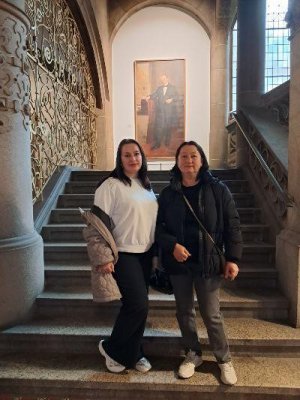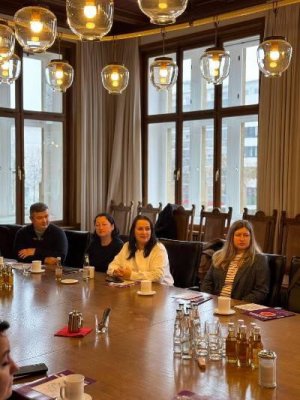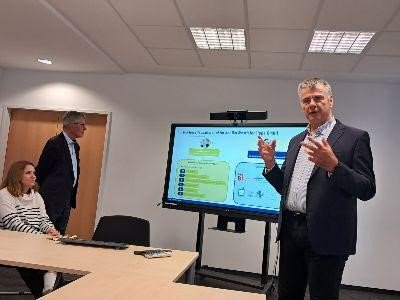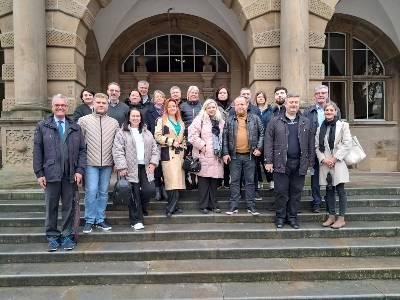Knowledge Exchange on the Third Mission in Germany within the UNICOM Project
The active collaboration between our university staff and representatives of other higher education institutions from Ukraine and European countries continues, particularly within the framework of the UNICOM project. This time, project working group participants, Associate Professors of VNMU named after M.I. Pyrogov, Olga Bratkova and Larysa Vakolyuk, visited Bielefeld, Germany, to gain new experience. The meeting, which took place from October 28 to 31, 2024, focused primarily on modern IT technologies, artificial intelligence, digital technology innovations, and their applications in working with higher education students. Additionally, discussions addressed capacity building, resilience, social cohesion, and sustainable economic growth strategies for regional development.
The consortium university representatives were warmly welcomed by the Professional School of Medium-Sized Business, where they were introduced to its achievements by Doctor of Historical Sciences Ralph Jürgen Treidel and prominent politician Friedel Heuwinkel. Participants learned about the school’s operations and its cooperation with state institutions and city administration. Notably, the discussion included the evolution of industry, from mechanization and electrification of production processes to automation and the use of cyber-physical systems, as well as how these changes impact societal welfare. A future challenge was outlined: maintaining quality of life and meeting societal needs in the new digital age, with prospects for developing medium-sized businesses, urban and rural investment solutions.
Professor Beate Brechmann explained the role of the Institute for Postgraduate Education and Practical Skills Development in the context of today’s digital technology advancements. The world is changing at all levels, presenting a challenge for humanity. This world requires workers who, in addition to professional qualifications, must possess remarkable interdisciplinary skills. Professor Brechmann emphasized the importance of lifelong learning and the need for consulting and supporting various companies across all areas of development.
Significant attention during the event was dedicated to artificial intelligence (AI). Professor Klaus Schafmeister presented its applications in the energy, transport, and agricultural sectors. AI is widely used in production, entrepreneurship, service-provider and client interactions, and data collection for product quality assessment and marketing. It was noted that in recent years, Germany has undergone large-scale digitalization and adopted AI as an integral element for future development. AI has become more accessible for everyday use than ever before, especially with the emergence of publicly available tools like ChatGPT.
Project participants also attended a seminar on hybrid learning in higher education. Hybrid learning began to be adopted in European countries during the pandemic and differs from blended learning in its approach. Hybrid learning involves synchronous education where one group of students is physically present in the classroom with the instructor, while another group participates virtually in real time through an online platform. Both groups can see, hear, and interact with each other during the course. Hybrid learning creates a flexible and dynamic educational environment, combining the benefits of traditional and digital teaching methods.
A fascinating topic on educational chatbots was also discussed. These digital tools assist students in finding the necessary information related to their study programs. Chatbots help students develop habits for independent learning and address various educational needs. Students can use chatbots to access advanced materials, in-depth research on specific topics, schedules, consultations, course updates, and learning resources. Chatbots can also be used to assess knowledge through customized tasks. However, the drawbacks include significant initial time investments and the need for continuous optimization to ensure response accuracy.
Participants were also offered a guided tour of the city hall, where they learned about Germany's regional land distribution and the specific features of regional development.
With the support of the Professional School of Medium-Sized Business in Bielefeld, the “City of Open Innovation” center was established, which was visited by university representatives. It became clear that innovation arises when people care about their city’s problems. Anyone can visit the innovation center and propose ideas for urban development. The center also introduces youth to political institutions, organizes meetings with city leadership, and provides career guidance for young people, involving all sectors of urban society to address pressing issues.
The study visit left participants with unforgettable impressions thanks to new connections, while the intensive program and insightful meetings made each day productive and rewarding. The event’s uniqueness lay in its use of original knowledge-exchange formats: interactive workshops, discussions, and visits to places where innovative solutions are created. We look forward to fruitful cooperation in the future!
UNICOM Project Working Group Participants
Olga Bratkova and Larysa Vakolyuk



